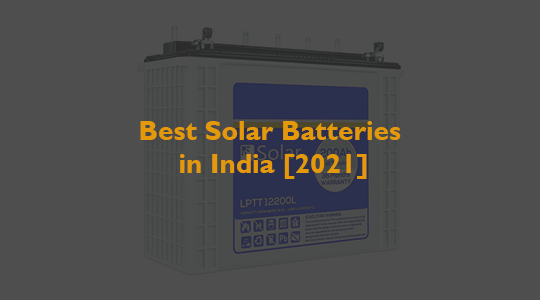Solar Battery Storage: The Best Solar Batteries in India [2021]

By installing solar panels, you can cut your monthly utility bills while also minimizing your environmental footprint. An essential part of setting up your system is finding the best solar batteries to store your power for use even when the sun isn’t shining.
Your home’s exposure to the sun’s rays is one factor that will determine the success of your solar power system. Additionally, an effective solar system requires the right panels, connected to the right battery.
Homeowners typically look for the best solar panels, but your battery is just as important. As such, it’s worth asking: What are the best solar batteries for use in your home?
Importance of a Solar Panel Battery Bank
Before assessing the best solar batteries, it’s important to clarify what makes batteries so significant.
How Solar Energy Storage Works
When you make the decision to go solar, you’ll have a series of solar panels installed on your roof. How solar panels work is that they collect energy from the sun and turn it into electricity. This electricity then passes through an inverter, which turns that raw electricity into a type of current that you can use to power your home.
Most home solar panel systems are connected to local power grid systems, which means that, if you ever produce more solar energy than your home needs, the excess is fed back into the grid. This typically results in a credit from your utility company. By contrast, if your solar system does not produce enough energy, you’ll draw energy from the grid.
Using a Solar Battery Bank
So where do batteries come into play? A solar battery bank will store energy that’s produced by your system, allowing you to use it later. So, if your system is creating a surplus of electrical energy, you can store it rather than feeding it back into the grid. Later, when your unit is not producing any energy (for instance, when after dark or on cloudy days), you can tap into those energy reserves in your solar battery bank.
The upshot is that, by having batteries for solar panels, you can have a backup power supply for times when the sun isn’t shining or for use during a localized power outage. However, you may want to consider a few of the best solar batteries before making a purchase for your home energy storage system.
5 Best Solar Batteries
As you juggle these different considerations and seek the best solar batteries for your system, here are a few specific products that earn our recommendation.
- Luminous Solar 150 Ah Tall Tubular Battery
- Luminous Solar LPTT12200L 200 Ah Tall Tubular Inverter Battery for Home
- Exide Solar Battery with Higher Backup (6LMS150 150 Amperes)
- Amaron Solar Inverter Tubular Battery, 150AH
- G Energy International Solar Tubular Battery 12V 150AH IT 500
Choosing the Best Solar Batteries
As you consider investing in your own solar system, you’ll have a few types of solar panels and battery backup options. Here are a few key things to look for when seeking the best solar batteries for your home.
Battery Capacity
Capacity refers to the total amount of electricity you can store in your battery. It’s typically measured in kilowatt-hours (kWh). Note that most solar batteries are stackable, which just means that, by combining multiple batteries, you can pool their collective storage capacity so that you can reserve a higher amount of energy.
Power Rating
In addition to a battery’s capacity, you’ll also want to take a look at its power rating. This tells you how much electricity the battery can provide at any given moment, and it’s typically measured in terms of kilowatts (kW).
So, how do power and capacity relate? Consider, for instance, a battery with a high capacity but a low power rating. This battery would be able to provide a small amount of electrical power (say, enough for a couple of small appliances) over a long period of time. A low capacity but high-power battery could produce enough electricity for much more robust appliances, but would only be able to power them for a short span of time.
Depth of Discharge
Another important consideration is depth of discharge. This refers to the level of charge the battery must maintain at all times, as dictated by its chemical composition. The rule of thumb here is that a higher depth of discharge means you’ll be able to utilize more of the battery’s total capacity.
Price and Warranty
Naturally, any time you’re investing in solar equipment, price point is going to be a big concern. Although you may not want to spend much on top of the cost of solar panels, keep in mind that what you’re really after is value. Different batteries have different costs associated with them, and paying less money for a less powerful battery may not be the most cost-effective option in the long run.
Closely related to price is warranty. Most batteries for solar panels will guarantee either a certain number of cycles or a set number of years. Warranty is something to weigh against price point, as it can have a major impact on overall value.



